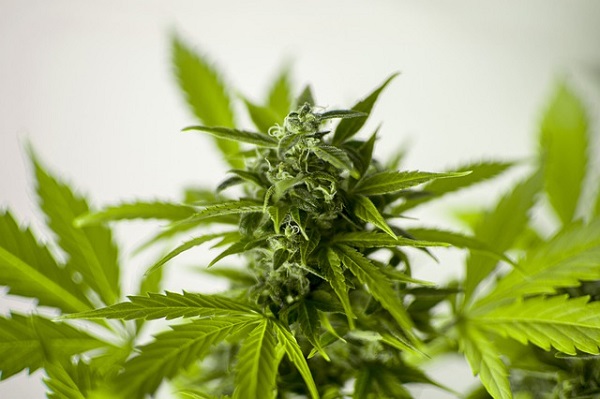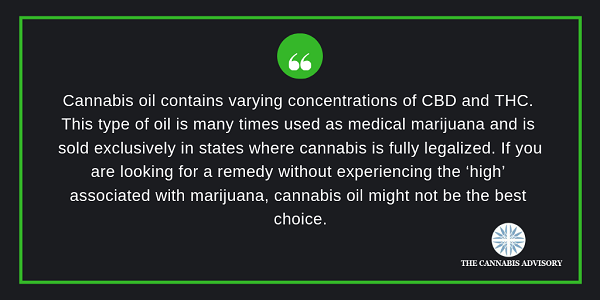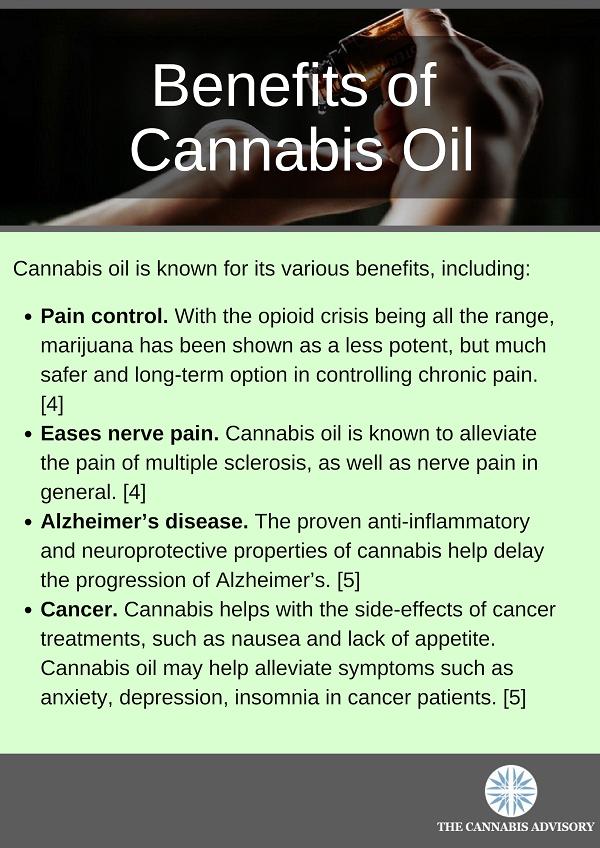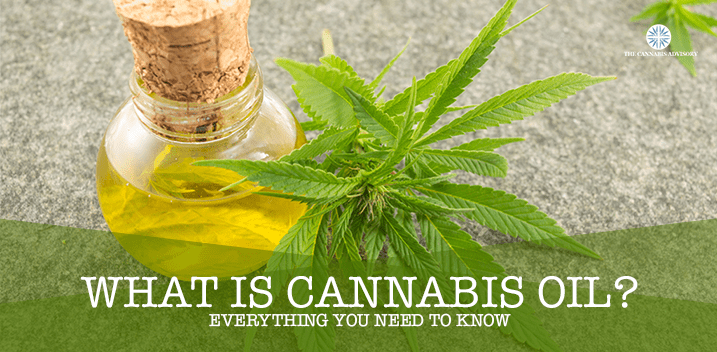The cannabis industry has been seeing substantial growth lately. Although many uncertainties are surrounding this relatively new field, so far, the positive reactions have outnumbered the negatives. We are slowly seeing a shift in thinking from “marijuana is a gateway drug” to “if used properly, marijuana offers a range of potential health benefits.” People have started using different cannabis products, including cannabis oil. However, there are still a lot of misconceptions surrounding the topic of cannabis oil, and you deserve to make an informed decision before using it.
Are you planning on buying cannabis oil? Let’s take a look at what exactly cannabis oil is, how to use it, and what the difference is between cannabis oil and CBD oil.

RELATED: These 5 States Could Legalize Recreational Cannabis Soon
What Is Cannabis Oil?
Cannabis oil is an extract derived from the Cannabis sativa plant. Just like lavender has its essential oil, cannabis oil is the concentrated essential oil of the cannabis plant.
Unprocessed cannabis oil contains the same amount of active ingredients as the cannabis plant, including the most popular ones: CBD and THC. Consuming cannabis oil is different from consuming dried forms of cannabis, such as marijuana. This is because the oil contains a well-controlled concentration of THC, CBD, and other compounds, and by taking a few drops a day, you can control your dosage even more. By smoking marijuana, you are inhaling an uncontrolled dose of these compounds. [1]
Cannabis oil is also known under the names of marijuana oil, THC oil, butane hash oil, hemp oil, cannabidiol (CBD) oil, and more. However, while all of these oils are extracted from the Cannabis sativa plant and fall under the umbrella term “cannabis oil,” that doesn’t mean they are all the same.

Cannabis Indica vs. Sativa
Before we proceed to talk about cannabis oil, let’s take a look at the varieties of the cannabis plant.
- The two main species of the cannabis plant are Cannabis sativa and Cannabis indica.
- Marijuana is made up of the dried leaves, flowers, stems, and seeds from both Sativa and Indica. Marijuana contains higher levels of THC that cause mind-altering effects on the user.
- Hemp, on the other hand, is a Cannabis sativa variety that contains low levels of THC (no more than 0.3 percent) and can’t get you high.
RELATED: How to Answer Your Budtender When They Ask “Indica or Sativa?”
Can Cannabis Oil Get You High?
Unlike hemp oil or hemp-derived CBD oil, cannabis oil can get you high because it contains higher levels of THC.

THC (delta-9-tetrahydrocannabinol) is the main psychotropic compound in cannabis. THC is a cannabinoid (a compound naturally found in cannabis) that causes alterations to the perception of reality and is believed to cause a person to become dependent.
Users who want to experience a high typically smoke marijuana as joints or in pipes. Some people use vaporizers that use a liquid marijuana extract to avoid inhaling smoke. There are also people who consume marijuana edibles or go to an extreme of smoking marijuana extracts. Also known as hash oil, honey oil, or butane hash oil, these extracts contain extremely large amounts of THC and should be avoided at all costs.
First of all, the preparation of marijuana extracts is illegal and usually takes place in people’s homes, where they use butane to prepare the extract—which is very dangerous. Countless cases of burnt houses and explosions have been reported over the years. [2]
Secondly, a 2017 research study published in the journal Drug and Alcohol Dependence found that the use of butane hash oil was associated with greater physiological dependence on cannabis. Although further research is needed, higher levels of THC are not recommended to users looking for relief for various ailments—or anyone, really. [3]
CBD (cannabidiol), on the other hand, is another main cannabinoid that does not have psychotropic properties. This means that CBD won’t get you high. Hemp is known to be rich in CBD, and since the signing of the Hemp Bill into law in the U.S., hemp-derived CBD oil became legal in every state.

RELATED: Is Cannabis Oil Legal?
How to Use Cannabis Oil
Cannabis oil can be used topically and orally. Using cannabis oil topically is recommended when dealing with inflammatory conditions that cause pain.
Symptoms of all of the ailments listed above can be relieved with persistent use of orally administered cannabis oil.

Cannabis Oil vs. CBD Oil vs. Hemp Oil—there Is a Difference
Ever since CBD oil become the go-to oil for various ailments, many people—thanks to news outlets—got the information that CBD, hemp oil, and cannabis oil are the same.
So, it is no surprise that some question whether there is a difference between cannabis oil and CBD oil. The biggest difference is their THC content. Here is what you need to know:
- Cannabis oil is derived from Cannabis sativa or indica and has a higher concentration of THC.
- CBD oil is extracted from the whole hemp plant—which is a variety of Cannabis sativa and contains low levels of THC (under 0.3%), which makes it impossible to get you high. If extracted from marijuana, CBD oil tends to have higher levels of THC. Therefore, hemp-derived CBD oil is more common, as hemp is legal in all U.S. states—unlike marijuana, which is legal in only ten states for recreational use and most of the states for medicinal use.
- Hemp oil is made by cold-pressing seeds that don’t produce any CBD, but during the extraction process, the oil can be contaminated with trace amounts of CBD and THC. Nothing to worry about—the levels are extremely low.
Cannabis oil is a more concentrated version of cannabis used primarily for its medicinal effects. The oil offers a range of evidence-based health benefits, so it is great to see the stigma around cannabis oil slowly diminishing.
Sources:
- https://www.theguardian.com/society/2018/jun/19/what-is-cannabis-oil-and-how-does-it-work
- https://www.drugabuse.gov/publications/drugfacts/marijuana
- https://www.ncbi.nlm.nih.gov/pubmed/28750253
- https://www.health.harvard.edu/blog/medical-marijuana-2018011513085
- https://www.bmj.com/sites/default/files/response_attachments/2015/03/Medicinal%20Cannabis%20The%20Evidence%20V1.pdf

